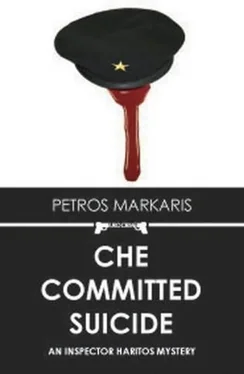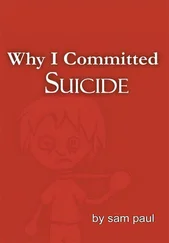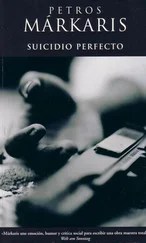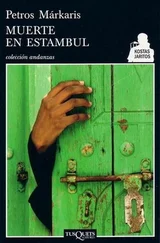‘Coffee?’
‘Greek, strong and sweet, thanks,’ I replied enthusiastically.
He must have been one of the last people in Athens to still make Greek coffee in the embers, with the coffee pot planted deep in the hot ash.
I climbed the external staircase behind him. There are two things that always impress you in Zissis’s house. The one evident, the other not. What was immediately evident were the enormous bookcases on every wall. What was not evident was the archive that he had compiled on every public figure in Greece. Now and again, he agrees to give me information from his archive, though he has never shown it to me. In answer to my question as to why he amasses all that material, he said that he did it most likely as a reaction. The state had kept files on him all through his life and he, in his turn, did the same for every public figure so as to bring about some kind of balance.
He came in with an old metal tray of the sort used in cafés and put the coffee on the table together with a saucer containing sweet preserves.
‘Since when have you started buying sweet preserves?’ I asked him in surprise.
‘My neighbour, old ma Andromache, gives them to me. Every time she makes them for herself, she sends me over a jar, the dear old girl.’
We sipped at our coffee in silence. Zissis, because he always waited for me to start the conversation, and I, because I wanted to enjoy my coffee first. Only the door was open. He had the windows shut and the house was like an oven. I took out my handkerchief and wiped the back of my neck with it.
‘The heat’s a killer.’
‘I wish it were hotter.’
I stared at him as if looking at an Eskimo. ‘Are you being serious? People are collapsing on the street.’
‘I soaked up so much damp in your cells that I can’t have my fill of it.’
I should have expected it. Every time he says something seemingly irrational, there follows the standard dig at the police.
As usual, I pretended not to notice so as not to wind him up any further. ‘I need to pick your brains.’
‘About Favieros or about Stefanakos?’
‘Let’s take them in turn and start with Favieros.’
‘Leading member of the student movement, always in the front line in the demonstrations and occupations, present at the Polytechnic
School rising, and all the rest: Bouboulinas Street, Military Police, torture.’
‘So how did he end up getting involved in all sorts of shady business?’
‘Because he became a businessman. He got involved in whatever was necessary for his businesses.’
‘And did his businesses oblige him to pretend to be the champion of the foreign workers while at the same time he was selling them over-priced hovels?’
He would suddenly erupt when you weren’t expecting it. Like then. ‘For years you broke us trying to get us to recant,’ he yelled. ‘Prison cells, exile, torture, to make us sign a statement. Now we sign the statement of our own free will with our businesses, the stock market, profits. Such success you could never have imagined not even in your wildest dreams. You’ve won, what else do you want?’
‘Me, nothing. They’re the ones shouting their mouths off about struggling on behalf of the underdog.’
‘Wake up, why don’t you! There are no underdogs when it comes to voting,’ he yelled again. ‘The real underdogs are those who come from elsewhere, without a voice and so they don’t count. The only underdogs when it comes to voting are the smokers! If the Party had had any sense, it would have organised a demonstration on behalf of smokers with the slogan: “Power to the damned” and it would have broken all records!’
When he gets in one of his black moods, it’s impossible to have a conversation with him. He explodes all the time at the slightest provocation. I decided not to persist with Favieros, but to pass on to Stefanakos, to see whether he might be a little calmer when it came to him.
‘And Stefanakos?’
His eyes lit up. ‘Don’t even waste your time looking. You won’t find anything on him either in the past or present,’ he said. ‘He wasn’t one to give up. He kept on fighting to the end.’
‘Okay, okay, Lambros,’ I said in a conciliatory tone. ‘They were both impeccable. So can you tell me why they committed suicide?’
‘Doesn’t the way they did it set you thinking?’
‘Naturally, but I still can’t understand why they decided to do it in public.’
He gazed at me pensively. He wanted to say something but was hesitating. ‘If I tell you what I think, don’t think I’m crazy,’ he said eventually.
‘Out with it, I know you’re not crazy.’
‘Because they couldn’t take any more. They were overcome by despair. The one despite all his business success and the other despite all his struggles. That’s why they committed suicide publicly, in order to make people sit up.’ He saw that I was looking at him in incredulity and he shook his head. ‘You don’t believe me because you’re a copper and you can’t understand. Money, fame, power, there comes a moment when you find yourself sinking in all the mud and you want to do something about it.’
I recalled Stefanakos’s last words: ‘I hope we’re not dying pointlessly’ or something of the sort. Perhaps what Zissis had said was an explanation, though I was afraid that things were more complicated than that. But I didn’t say so. I preferred to leave him under his painless delusion.
‘Come round some time when it’s not because you need my help,’ he said as I was about to descend the staircase.
Anyone else would have felt offended. But, knowing him as well as I did, I understood that it was his way of saying that he liked having a coffee with me.
I found Koula alone at home. She was sitting in front of the computer and updating her files. Adriani wasn’t there.
‘She went out to buy some T-shirts for your daughter,’ Koula explained. ‘So she’ll have something to wear in this hot weather.’
I had never been able to understand her mania for buying Katerina all sorts of small items and sending them to her by parcel post, when she could buy them for herself in Thessaloniki for the same money and probably even cheaper.
‘Before she left, she told me to tell you that a Mr Sotiropoulos phoned and he wants you to call him.’
Koula looked at me puzzled. She knew Sotiropoulos, just as she also knew my dislike of reporters, and she was surprised that Sotiropoulos in particular should phone me at home. I considered whether it was better to tell her the truth or to make up some excuse and I settled on the former.
‘I’m right in telling the Chief that you’re far more flexible than you seem,’ she said with a wry smile.
‘But he maintains that I’m a stickler,’ I retorted, as I knew the storyline only too well.
‘Sort of.’
‘At any rate, the business with Sotiropoulos is to remain between you and me.’
‘Whatever you say, but you’re wasting a golden opportunity to go up in the Chief’s estimation.’
I should have seen that much earlier. Now I’d missed the boat. I told of the government’s wish that we discreetly investigate the two suicides, but I didn’t mention Petroulakis’s name nor did I say anything about his desire to pin the suicides on the Philip of Macedon National Greek Front. I ended with my meeting with Karyofyllis, the public notary and I left Zissis out of it completely.
Once I’d updated Koula, I called Sotiropoulos on his mobile phone.
‘We have to talk,’ he said, as soon as he recognised my voice. ‘Where are you now?’
‘I have to go to Polydrosso and after that I’m free.’
‘Fine, I’ll be done in a couple of hours. Let’s meet at the Flocafé in Kifissia. Wait for me if you get there first and I’ll do the same.’
Читать дальше












